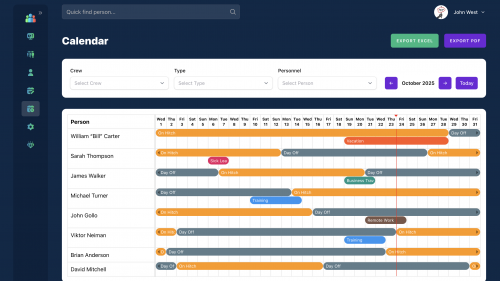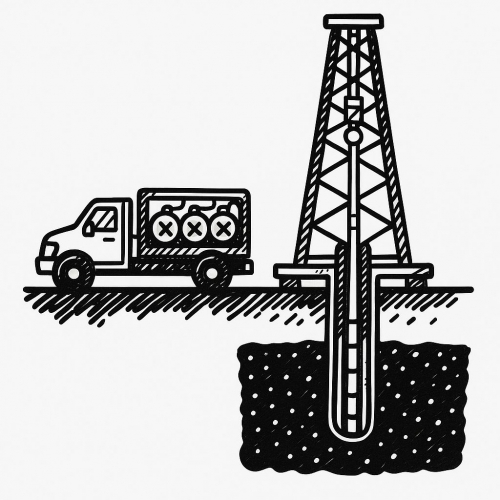Essential STCW Courses for a Maritime Career in Offshore Oil and Gas
Working in the offshore oil and gas sector often means operating in one of the most challenging environments on Earth. Whether transporting crew to offshore platforms, managing cargo on a supply vessel or performing technical tasks on board, maritime roles require specialized knowledge and internationally recognized safety certifications. Among the most critical qualifications for seafarers is the STCW framework; a global standard for safety and operational readiness at sea.
This article tackles why(Standards of Training, Certification and Watchkeeping for Seafarers) STCW courses are important for maritime professionals working in oilfield operations, what STCW training entails and how obtaining these certifications can open doors to a wide range of offshore careers.
What are STCW courses and who needs them?
The International Maritime Organization (IMO) introduced the STCW Convention to standardize the qualifications of seafarers worldwide. STCW courses refer to the structured programs that prepare maritime workers to meet these international standards. For anyone working on commercial vessels, offshore support ships or crew transfer boats, completing these courses is not optional; it is a mandatory entry point.
In the context of oilfield logistics, STCW training is particularly relevant for deckhands, engine room personnel, cooks, watch officers and safety managers who spend extended periods aboard vessels. These courses are designed not only to ensure individual readiness but also to contribute to the overall safety and efficiency of the ship’s operation.
Companies operating in offshore energy rely heavily on marine crews to deliver equipment, transport workers and respond to emergencies. Without qualified personnel who have completed their STCW courses, these operations would not meet legal or safety standards.
Core elements of basic STCW training
The most widely recognized module is the Basic Safety Training (BST) package. This is often the first set of STCW courses that a maritime professional must complete before stepping on board. It consists of four components; each aimed at addressing critical safety scenarios at sea.
- Personal Survival Techniques (PST): Teaches how to survive in open water using life rafts, personal flotation devices and distress signals.
- Fire Prevention and Firefighting(FPFF): Provides practical and theoretical knowledge on how to extinguish fires, use breathing apparatus and carry out fire drills.
- Elementary First Aid(EFA): Covers basic medical response; from treating wounds to managing shock and unconsciousness.
- Personal Safety and Social Responsibility (PSSR): Focuses on teamwork, safety culture, and individual roles during emergencies.
Completing these modules provides seafarers with a strong foundation in maritime safety. These subjects form the basis of STCW training and are universally required regardless of job title or vessel type.
Why STCW training is critical in oilfield maritime operations
In oilfield logistics, the work environment is high-risk; offshore supply vessels often operate in rough seas, tight schedules and remote areas far from emergency responders. In such conditions, having trained personnel can be the difference between a successful voyage and a life-threatening incident.
STCW training equips crew members to handle real-world emergencies, including collisions, fires, abandon-ship situations and medical incidents. For example, crew members trained in personal survival techniques can quickly deploy life-saving equipment when a vessel must be evacuated. Similarly, fire prevention training becomes vital when working with combustible cargo and hazardous fuels.
Oilfield team readers involved in vessel management or hiring maritime crew should ensure that all staff have up-to-date STCW courses completed. Not only does this reduce liability, but also enhances operational resilience in unpredictable offshore conditions.
STCW courses vs. Other offshore certifications
Many professionals confuse STCW training with offshore certifications like BOSIET (Basic Offshore Safety Induction and Emergency Training). While both are essential in the energy sector, they serve different purposes.
STCW courses are maritime-focused; required for anyone working aboard sea-going vessels. BOSIET, on the other hand, is designed for personnel who travel to offshore platforms by helicopter and do not work aboard ships.
For example, a crane operator stationed on a fixed oil platform might need BOSIET but not STCW. In contrast, a cook or engineer assigned to a supply vessel must complete STCW training even if they never set foot on a rig. These distinctions matter, especially when preparing a workforce for projects that involve both marine and platform-based operations.
Therefore, understanding the scope of STCW courses ensures that your crew has the correct qualifications for their actual work setting, not just a general offshore safety course.
Refreshers, validity and advanced STCW training options
Like many safety certifications, STCW training is not a one-time requirement. Most courses must be refreshed every five years to remain valid under IMO(International Maritime organization) regulations. This ensures that skills remain sharp and aligned with the latest safety procedures and equipment standards.
Seafarers advancing in their careers may also take specialized STCW courses beyond the basic modules. These include:
- Proficiency in survival craft and rescue boats (PSCRB)
- Advanced firefighting
- Medical First Aid or Medical Care at Sea
- Leadership and managerial training for officers
Each of these advanced STCW training paths allows seafarers to qualify for more technical or supervisory roles. For those aiming to move into engine management or bridge watchkeeping positions, advanced certifications are a must.
If you are already certified but nearing the five-year mark, refresher STCW courses are widely available and can often be completed in a shorter time frame than the initial training.
Where to take STCW training
Approved maritime training centres around the world offer STCW courses in compliance with IMO standards. These centres typically provide the full Basic Safety Training package along with optional advanced modules. It is essential to verify that any provider is accredited by the relevant maritime authority in your country or region.
Some organizations, such as FMTC Safety, offer STCW training across multiple locations and even provide tailored programs for offshore energy sectors. While not exclusive to oilfield professionals, these providers often understand the specific demands of oil and gas logistics and can incorporate relevant scenarios into the training experience.Course durations range from three to five days depending on the content and whether it includes practical simulations.
Building a career path with STCW certification
Completing STCW courses is not only a legal necessity but also a smart career move. Maritime employers view valid STCW certificates as a baseline qualification; without it, applications may not even be considered.
With this certification in hand, seafarers can pursue roles such as:
- Bosun or deckhand on a supply vessel
- Motorman or oiler in the engine department
- Cook, steward, or messman for marine catering operations
- Watchkeeping officer or marine engineer (with further study)
Many of these roles are stepping stones to more senior positions. Investing in STCW training early ensures that you remain eligible for contracts in both commercial shipping and offshore energy.
Conclusion
For maritime professionals supporting the oil and gas sector, STCW courses represent more than a checkbox for compliance; they form the foundation of a competent, confident and safety-ready crew. By completing and maintaining your STCW training, you not only meet international safety standards but have long-term career opportunities in the global maritime industry. These certifications enable professionals to work safely and confidently in hazardous environments, including offshore sites such as oil rigs and vessels operating in world oceans.

%20(1).png)



